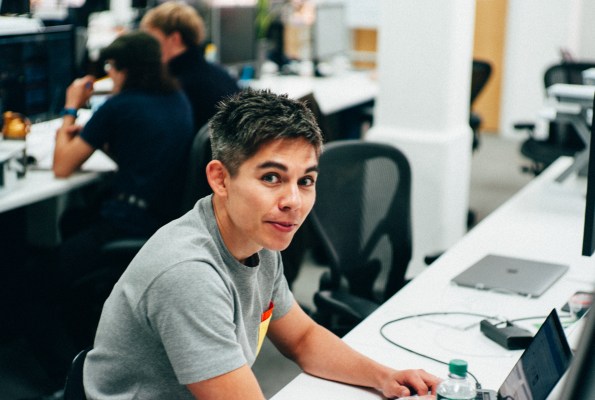“Every so often I get like the odd sort of flashback where it jolts me a little bit, but it’s only ever a snippet, that fraction of a second before I actually hit the car. I don’t really remember much about the actual accident”.
“That’s probably just as well, right?”
“Yes, I don’t think it’s the kind of thing you really want to remember”.
I’m sat in the brightly lit conference room of GoCardless, the high-growth London fintech startup backed by the likes of Accel, Balderton, Notion, Passion and Silicon Valley’s Y Combinator. The room is a little too warm for my liking, which is making me slightly anxious. I’m also acutely aware that I’m the disabled journalist who has agreed to write a feature on the disabled entrepreneur, even if my subject, the company’s 31 year old co-founder and CEO Hiroki Takeuchi, is a relative newbie.
I was born with a muscle condition that means I’ve used a powered wheelchair for most of my life: it’s all I have really ever known. In contrast, it has only been a year since Takeuchi was involved in a serious road accident that has left him paralysed below his chest, and reliant on a manual wheelchair to get around. Bar some kind of moonshot-styled medical miracle, he’ll never be able to walk again.
This interview — the GoCardless CEO’s first with the technology or business press since the accident — came at his request and I’m flattered to learn that it warranted consultation with the company’s board. Before I hit record on my iPhone, I politely kick the startup’s perfectly affable PR flack out of the room, and explain to Takeuchi that the only real preparation I’ve done for this assignment is to have a brief call with Matt Robinson, who, along with Monzo Bank’s Tom Blomfield, co-founded GoCardless with Takeuchi in 2011 but has since left to found property tech startup Nested.
As a “favour” to him, Robinson asked that I keep in mind that his close friend can sometimes be too open. “I like Matt but he’s kind of annoying,” I say jokingly, after recounting the conversation. “He can be annoying, can’t he?” Takeuchi replies with a wide and knowing smile.
After agreeing that there would be no redlines, I begin by asking Takeuchi why he wanted to do an interview with TechCrunch, and why now? “That’s a good question,” he says. “I think because I’m kind of getting to that point now where there is a bit more normality in life. I’m feeling more my old self; there’s lots of exciting stuff going on here at GoCardless.
“I kind of feel like we haven’t really talked about it as a company or me as an individual much, and selfishly, I kind of want to avoid the question of ‘what happened to you, why are you in a wheelchair?’. I’d rather just get the story out there on the record so that we can put it to rest and focus on the more important stuff, which is building a business”.
***
The story begins on a sunny early Thursday morning in Central London on 22nd of September 2016. Takeuchi, who always has and continues to be someone who likes to push himself physically, was doing laps around Regent’s Park in what was otherwise a routine before-work bike ride with his brother, the sort of training session the two of them had undertaken many times previously. After a momentary loss of concentration, he says he looked up and saw that there was a car right in front of him. Seconds later he passed out.
“I wasn’t doing anything stupid, I wasn’t cutting red lights or any of that stuff,” says the GoCardless CEO, describing the subsequent collision simply as an accident with neither party to blame. “I was just unlucky, I guess”.
First to arrive on the scene was his brother — “he’s a bit slower than me, so he was a minute or so behind” — and spotting that Takeuchi had sustained a huge gash on his neck and was bleeding heavily, he immediately called for an ambulance. By around 8.30am, the pair arrived at St Mary’s hospital in nearby Paddington and were later joined by Takeuchi’s wife Rachel Swidenbank, who was able to have a ten minute conversation with her husband before he was due to go into surgery. “I’ve messed everything up,” she recalls him telling her. Takeuchi tells me he still feels a sense of guilt.
Delivered without sugar-coating and designed to manage expectations, the prognosis from doctors wasn’t good. The aim of surgery was to straighten Takeuchi’s spine and fix his posture, not to enable him to walk again. If during the procedure the doctors saw additional work that could be done, they would do it, but he shouldn’t allow himself to think that he would wake up and be walking.
The subsequent operation would last eight long grueling hours. And yet, according to Swidenbank, when the GoCardless CEO woke up in the early hours the following morning, with traces of morphine almost certainly still running through his veins, his attention immediately turned to business.
“That morning I got to his bedside and was like, ‘I’ve brought you some stuff to try and eat, and the first thing he said was: ‘I need to speak to Matt’. I was like, ‘alright, [but] how about your wife?” she tells me, laughing.
“I remember being a little blown away by him. Even with everything that had happened and what was going to face us for the next however many months, the first thing he wanted to get sorted was to make sure the company was going to be Ok”.
“It definitely played on my mind,” says Takeuchi. “I kind of realised that this was pretty serious and wasn’t something where I was just going to turn up back at work tomorrow. I was going to be out for more than a few days”.
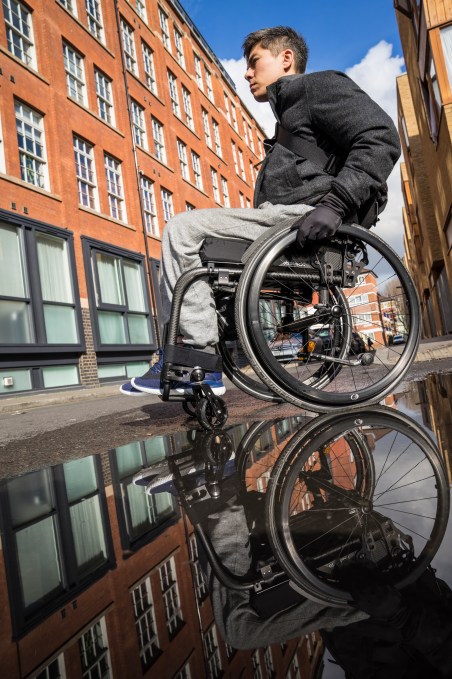
Photo credit: Rachel Swidenbank
Robinson describes the ad-hoc business meeting that followed as “borderline inappropriate”. “There was me and him talking, family and friends there, obviously sobbing and upset, and Hiroki and I are having a business meeting about what we’re gonna do”.
Continues Robinson: “At that point it was clear that everything had changed but nothing had changed. We could have switched us out from the ward with a guy who has been in a major life threatening accident 24 hours ago and we could have been back in the flat where we started the company in the first place: Hiroki would be back, it was just a question of when”.
“The thing that was amazing in the moment is you are so scared of losing the person or something about him that might not be the same,” adds Swidenbank, “it was like, that drive and that ambition, ‘this isn’t going to stop me,’ was there from that first morning”.
Takeuchi says in retrospect that having a business meeting so soon after the accident was “really weird,” and aside from a key hire the company was in the middle of making, the pair discussed mostly trivial stuff. “There were all these details that in hindsight didn’t really matter,” he says.
During those first 48 hours, Robinson had made sure the GoCardless board was kept up to date. At the suggestion of Balderton Capital’s Tim Bunting, a conference call was convened on Saturday morning where he and Robinson would be joined by Passion Capital partner Robert Dighero, Notion Capital partner Stephen Chandler, and Fred Destin for Accel. Midway through the call, however, and to the astonishment of everybody present (with, I suspect, the exception of Robinson), a welcome but unexpected guest showed up.
“Hiroki dialled in, which was incredible,” recalls Dighero. “He was no more than 24 hours out of surgery and his voice was quavering but he was very clear: ‘I’m coming back, I’m going to be running this company, and I wanted to let you all know’… which was unbelievably impressive, takes your breath away”.
Chandler describes the reaction as a mixture of “incredulous wonder at the resilience of the human spirit” and Takeuchi specifically, but also slight concern that he gave himself enough time to recover and that this wasn’t rebound type behaviour.
“At the end of the day, we are VCs and there’s a lot of money tied up in the business but there was never a question or a discussion about anyone taking Hiroki’s place other than if it came about at his instigation,” he says.
“I think he was probably semi-delirious from drugs but it was one of those kind of moments that you always remember,” says Bunting. “We were able to say to him immediately on the call, ‘the company is waiting for you, you should completely relax, everyone knows you are going to make a recovery, and we look forward to having you back’”.
“[It was] an amazing thing to hear,” recalls Takeuchi. “It gave me the ability to focus on what I needed to focus on but it also gave me something to work for”.
Over the next couple of weeks, a familiar pattern would emerge. In between the GoCardless CEO resting post-surgery, multiple friends and family descended on the hospital, sometimes to the annoyance of medical staff who had kindly snuck a spare mattress into Takeuchi’s room so that Swidenbank could remain by her husband’s side.
One of the most frequent visitors was Robinson, who, having agreed to return to GoCardless to help out in the interim while still running his own startup, soon got a reputation for consuming whatever little energy his friend and co-founder had left each day. “No one wanted to visit Hiroki after me,” he says.
“For those first few weeks, when I went in to see him, we did hang out as mates — and it was really fun actually as we hadn’t spent much time together because I was off doing Nested — but we would spend most of our time talking about the company and what we would do.
“And yeah that was probably trivial with all the other stuff going on and we could have just forgotten about it, but I actually think it was probably really valuable to him because he was stuck in a fucking bed all day worrying about pretty existential stuff, and having something that may be a little bit more trivial but actually does matter was really helpful from the get-go”.
“Matt had his back,” is how Swidenbank puts it when describing how her husband needed to stay informed with what was going on at GoCardless so that he could maintain his own leadership during that time. “The trust that Hiroki had with Matt is what enabled him to continue to work towards GoCardless despite his capacity being so limited. That closeness and that trust was something that I look back on as really amazing”.
***
Confident that GoCardless was safe in Robinson and the executive team’s custody and would continue to execute without him, Takeuchi says he went through a period where the magnitude of the accident began to sink in. “I was still being kept up to date but really my mind was elsewhere,” he tells me. “I was focused on rehab and all the fun stuff of being in hospital and trying to get out of hospital. I don’t know if you’ve spent much time in hospital, it sucks”.
(As Takeuchi and I compare notes, I explain that I was in and out of hospital a lot as a kid, having had multiple operations. “I’ve done everything in my power since to avoid going back,” I say. “Yeah, I know what you mean,” he replies, “I hate it”.)
Even though it is hard to imagine after seeing him push himself around the GoCardless offices with what seemed like relative ease, Takeuchi says that in those first few weeks he was unable to lift his head off the pillow and could barely move.
“So you really were fucked?”
“I was totally fucked”.
To compound matters, he contracted an MRSA infection in early October, which required him to undergo further surgery before he was able to focus solely on rehab. At the insistence of Bunting and Robinson — and despite some initial resistance from Takeuchi whose instinct was to be treated within the National Health Service just like anybody else — on October 22nd the GoCardless CEO was moved to the spinal rehabilitation unit of The Wellington, a private hospital in North London.
“This is one of the things where the board were really supportive. They were like, ‘you need to go and get the best care you can’,” he says.
In this instance, and at Takeuchi’s request, the best care meant throwing as much rehab at him as he could handle. He says he treated it like a fulltime job, 8am to 6pm, every day. “It was pretty exhausting, to be honest, but if they gave me a break, I’d be like moaning about it”.
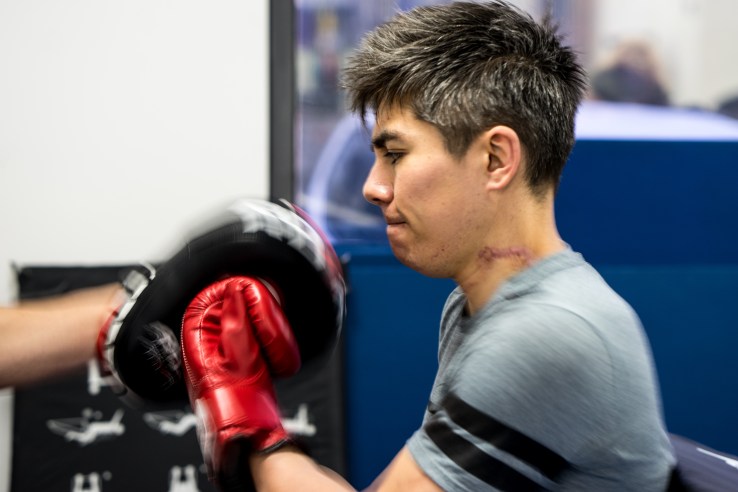
Photo credit: Rachel Swidenbank
“You kind of have to relearn how to use your body,” he explains. “Part of it is recovering from all of the shock and everything but also you have to start building up different muscles so that you can wheel around in a wheelchair or you can balance when I have no control over my core. Those top two abs have got to do a lot more work if I’m not going to fall over. It’s a combination of conditioning what you’ve still got, getting over the shock and relearning how to do things”.
Determined to be home before Christmas, Swidenbank remembers Takeuchi asking medical staff what the fastest time was for someone with his level of injury to have ever completed the program. Six to twelve months was typical, he was told, although one person had done it in three. “Ok, I’m going to do it in six weeks,” Takeuchi replied, to the bemusement of doctors. He was discharged on the 16th of December, just seven weeks later.
“You hear all these stories when you’re in hospital, when you’re exposed to this world of spinal cord injuries, people get stuck in hospital for 12-18 months,” he says. “One person was in hospital for two years, and that just sounded like my worst nightmare. Imagine being in hospital for two years, it would be terrible”.
Private healthcare isn’t cheap and I wonder out loud how Takeuchi’s stay at The Wellington Hospital was paid for. Did GoCardless pick up the bill or was he insured? “It was a bit of everything,” he says. “Let’s put it this way, the board were very supportive about helping to make sure I got the best care possible. To be honest, I don’t know where the money came from. Matt was like, ‘I’ve sorted it’”.
“Just lots of people doing the right thing,” is all Robinson would say on record.
***
On 25th of November 2016, two months after the accident, Takeuchi was sat on his bed practicing a speech. For only the second week running, he had been allowed home from hospital for the weekend and things were quite tense. As CEO, he had spoken in public many times before — sometimes he would write a formal address and other times he would just wing it — but this felt different: it was the GoCardless Christmas party and his first opportunity to fully address the company since the accident.
“I didn’t tell anyone I was going to go, because we weren’t really sure if I was going to be able to go or not,” says Takeuchi. “And I remember, I felt super nervous about that. It would be the first time that I’d see the company as a whole, in a wheelchair and in this new life”.
“We were both a little bit on edge, ” says Swidenbank. “We hadn’t really been to any big event, we’d barely left the hospital. It was a really big deal”.
“At that point he was still up and down every day,” says Robinson. “His energy levels were really unpredictable and one day it would be absolutely fine but the next day it would be a terrible idea. I wanted to have it so he could do it but then have it that no one was like ‘oh he was supposed to come but he couldn’t make it’. That would have been a negative and we wanted to make it positive”.
“I almost didn’t go,” confesses Takeuchi. “Rachel was like, ‘no, you’re going to this, you have to go’. So, that helped a lot”.
For any wheelchair user, new or otherwise, logistics are a necessary focus in situations like this, but can also be an extra cause of anxiety. The venue for the GoCardless Christmas party had to be accessible, and one of London’s iconic (and wheelchair-friendly) black taxis would need to be summoned well ahead of time. Despite initially being dropped off on the wrong side of the street and faced with an unexpected slope that, early in his recovery, would test Takeuchi physically, all bases had been covered.
Bar one.
“Normally he would stand up to do a speech, so suddenly he was like, ‘how do I get everyone’s attention?!’ recalls Swidenbank.
“He was super anxious about it, but rightly so,” says Robinson. “He didn’t want to be sat there with a mic, in his chair, and people to be wondering where the noise was coming from”.
The solution was to have Robinson, who by now had started to think of himself as the “harbinger of doom” at GoCardless, make a short introduction before handing the microphone over to his co-founder. “‘For once I’ve got something good to announce: Hiroki’. That’s literally all I said. Everyone in the room stood up and kind of exploded”.
Takeuchi tells me he doesn’t remember the exact content of the speech, except that he wanted to thank everybody who worked at the company. “I’d seen how everything was going and it was like, ‘thank you for continuing to do such great work’. A lot of people had to really pull things out of the bag and step up, so I just wanted to appreciate that really”.
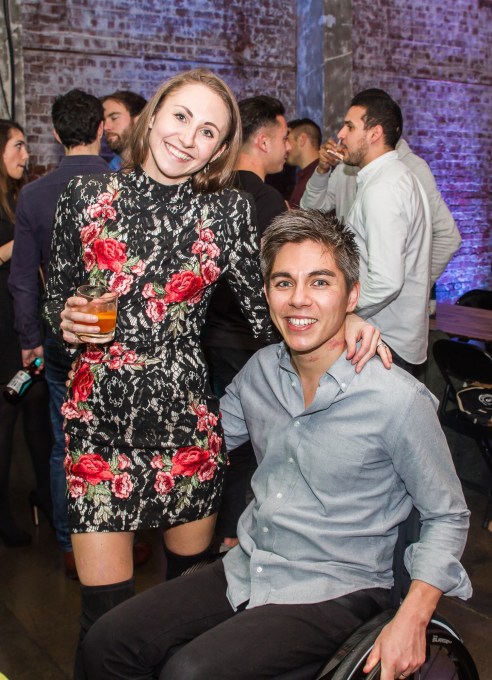
“Did you make any jokes?” I ask. “Yeah, of course I did” he replies, as if I just asked a really stupid question. “I mean, it took about a week before my friends and family were all taking the piss out of me for being in a wheelchair”.
“I think Hiroki’s joke might have been: ‘I’m not gonna stand up,’ which doesn’t sound that funny but it was probably what was required,” says Robinson.
Swidenbank says it was a very special moment because of the strength her husband displayed even though she knew deep down he was still coming to terms with everything that was going on. “He was able to hold himself in such a position and instill confidence in everyone else that he was going to be Ok and that the company was going to be Ok. And not just Ok but be amazing,” she says.
Takeuchi and Swidenbank stayed at the party for a few hours, ending the night on the dance floor together as they had done many times before.
***
“I’m fucking terrible with [other people’s] anxiety, I’m just not a very anxious person,” Robinson tells me. “It wasn’t even particularly warm, but I turn up and I’m like, ‘we’re walking’.
It was December 5th, a Tuesday evening, and a table had been booked at Lemonia, a greek restaurant in North London and a 21 minute walk from The Wellington Hospital, according to Google Maps. The occasion was a board dinner where all of the GoCardless investors would be present. Takeuchi, who, understandably, was feeling a little anxious, wanted to take a taxi, but his friend had other ideas.
“I just felt he needed a shove,” says Robinson. “He thought I was joking and said, ‘you’re not joking are you? Fucking hell, the things you make me do’. So we start walking over to this restaurant. What I forgot is that the bit of the park you have to go through, there’s a big fucking hill. I remember Hiroki being like, ‘mate, this is fucking bullshit’”. At that stage of his rehab, he was unsure if he could manage.
“I was like, ‘fuck that, we’re not going to be beaten,’ so I gave him a push. He didn’t want to be pushed but we would never had made it up there. Even with me pushing him, it was bloody hard work, but together we made it to the top and got to the restaurant”.
“They turned up a bit late, Matt was looking a little bit out of breath,” confirms Dighero. “I remember that dinner: Hiroki pulled up his wheelchair at the table and after five minutes you totally forgot that he’d just had a terrible accident a few months earlier. You really wouldn’t have been able to tell”.
Adds Robinson: “We’ve never given a fuck in the past, right, we’ve always done whatever we wanted: if wanna walk, we walk, if we wanna run, we run, you know. And it felt like the chair was trying to impose that we had to take a taxi. Fuck that, it’s a nice evening, we’re gonna walk and we can”.
Takeuchi messaged his friend after the dinner to say thanks for making him do it: “It was hard, but it just showed I can do stuff,” he reportedly wrote.
***
It has been nine months since Takeuchi returned to GoCardless and eight since the board meeting where Robinson formally handed back management of the company. He tells me staff have been really supportive and that no one has made him feel uncomfortable. “The things that I’ve found awkward or difficult are more personal, more a projection of how I feel about myself,” he says.
“For example, one thing I find difficult, I don’t know if you’ve noticed but I’m leaning on everything I’ve got. It’s actually quite difficult for me to sit upright. So when I’m talking in front of everyone, and I’ve got nothing to lean on, and I’m trying to hold a microphone, I’m sort of like wobbling around. I’m quite self-conscious about that kind of stuff”.
Of course, until Takeuchi pointed it out, I hadn’t noticed at all. All of a sudden I become aware that I’m sitting with my elbow resting on my lap, using one arm to grip the other, which is in turn supporting my chin. To body language experts it probably looks like a defensive posture when mostly it just enables me to sit comfortably for longer.
“My strength is quite variable, some days I’m really strong and fine and other days, for no particular reason, everything is harder and you almost miss a transfer,” says Takeuchi. “That kind of stuff I don’t like people seeing”.
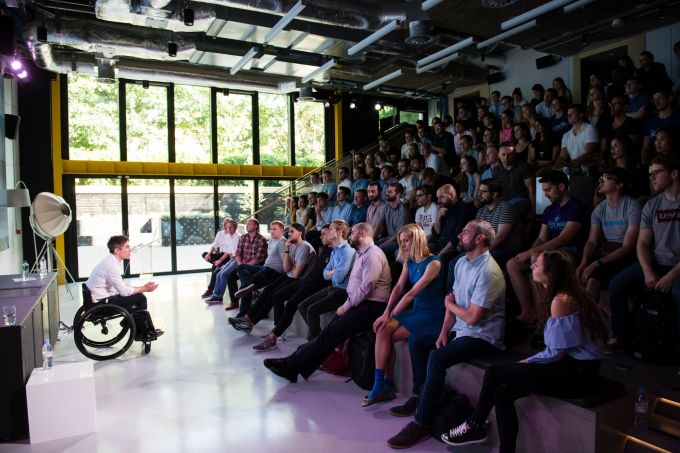
One of the things that has impressed him the most is how well the team did in his absence. Despite being out of the picture for nearly four months, the business continued to grow, although he declines to disclose revenue or if the company is profitable. “We don’t share those kind of details,” he says, as we temporarily occupy more formulaic ground.
Was it a tiny bit annoying how well GoCardless coped without him? “No, it feels great,” he says. “It’s not like you build a business because you want to be the center of it. You want to create something that is meaningful and lasting. Or at least that’s how I feel about it. It felt really amazing that the business did do well and continued to grow and thrive, even when I wasn’t there”.
At this point in the interview I fall back on journalistic cliches and ask the GoCardless CEO what kind of leader he is and if the accident has changed him in any way. The first part of the question appears to catch him slightly off guard, as if it isn’t something he’s ever given much thought to. After a long pause he says he can be quite challenging and doesn’t just take things at face value if he thinks something can be done better, but his default style is to seek different opinions around the table before ultimately making a decision.
All three investors I spoke to give roughly the same answer but with far less deliberation. “He’s more driven by getting everyone around him, listening to everyone’s opinions and then taking a decision,” says Dighero. “Consensual, based on the facts rather than emotion,” says Bunting. “An extremely smart person, [with a] very big brain, so you can kind of see it ticking over behind his eyes. He’s always willing to listen to other people’s opinions, but then at the end of the day he doesn’t have to agree with them, and he says ‘no, I want to take it in this direction’,” says Chandler.
Takeuchi thinks the accident and the process of going through it all has changed him in some ways but not at all in other ways, although he fails to articulate precisely how, except perhaps to say that he is more inclined to live in the moment. “I still feel like I’m the same person as I used to be. Not all of the time, but most of the time. And I think that has been important for me personally to get through this,” he says.
From a professional perspective — and perhaps surprisingly — Takeuchi is convinced that the accident could turn out to be a “net positive” in the sense that it has made him reconsider what the company has been doing and to “look at everything with a fresh pair of eyes”. “It also forced me to rethink my relationship with the company, and it’s quite hard to do that when you’re not forced to do it because there are always so many things to do”. Specifically, he says he now has a better understanding of what parts of the business he can add most value.
One area of renewed focus is international expansion. The company already operates in the U.K., France, Germany and Spain, but Takeuchi is keen to increase the pace at which GoCardless grows abroad. “That’s the thing… I’ve come back and I’m just like, ‘we can’t wait any more, we just need to do this’,” he says.
That, I suggest, will likely require additional capital, and ask the GoCardless CEO if the company is currently fundraising? “We’re not talking about fundraising today, Steve. You know I’ll call you if we are,” comes Takeuchi’s stock and all-too-familiar reply, what we in the media call a non-denial denial.
I try from a different angle: “Are you out doing the rounds? I mean, you’re doing this article, so when you do bowl up to pitch…” “Yeah, at least they’ll know to expect me in a wheelchair,” he fires back with a wry smile.
